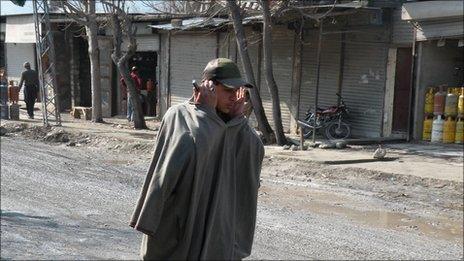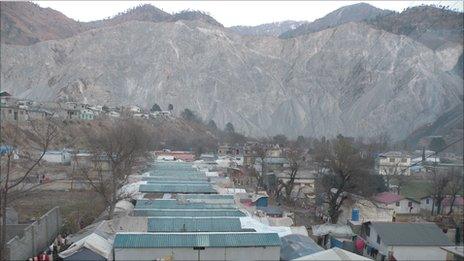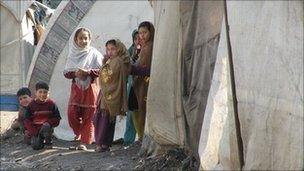The Kashmiri fighters who lost their cause
- Published

Kashmir has been a disputed territory since 1948
In the quagmire of Kashmir militancy, those who took up arms for independence appear to have been quashed. The BBC's M Ilyas Khan investigates the fate of the Kashmiri fighters who did not want to be ruled by India or Pakistan.
Ismat Karim gives a harrowing account of a recent 20-day detention in what he calls a "torture cell".
Mr Karim says he was held along with two other residents of Pakistan-administered Kashmir and describes how they were "punished and interrogated" in turn for half-an-hour every evening.
"They would whip us with lashes, and ask the whereabouts of a person whose name we had never heard."
They were given no reason for their arrest.
Mr Karim was an emotional and aggressive activist who belonged to the United Kashmir Peoples National Party (PNP), which advocates a sovereign Kashmir, independent of both India and Pakistan.
He says that he had been rounded up by Pakistan's powerful Inter-Services Intelligence (ISI).
Pakistan's military spokesman, Athar Abbas, told the BBC that all such allegations were simply not true. But Mr Karim has now quit politics out of fear.
Independence hopes
In Kashmir, such groups are called pro-independence, as opposed to pro-Pakistan groups that advocate union with Pakistan.
Pakistan and India went to war over Kashmir in 1948. A ceasefire negotiated by the United Nations left the region divided between the two countries, pending a final resolution which still remains elusive.
While initially there was a predominantly pro-Pakistan sentiment across the region, over the last few decades many pro-independence groups have emerged.

Many former independence fighters live a life of social and economic exclusion
Pakistan's security establishment, which India accuses of fuelling an insurgency in Indian-administered Kashmir since 1989, views these groups with suspicion.
Abdul Majeed is a member of one.
Many years ago while he was a student he was implicated in as many as 47 different criminal offences ranging from murder and treason to rioting and theft.
"For three months I was in a police lock-up. When the court set aside one case, they would bring another one against me," he says.
Finally, a senior law enforcement official summoned him to his office and told him that if he withdrew from student politics, the court cases would be quashed.
"I assured him accordingly. Three days later I was released. I stayed away from politics for several years."
Former Kashmiri militants who later gave up fighting have also been under pressure.
The first group of fighters to renounce militancy was linked to the Jammu and Kashmir Liberation Front (JKLF), a secular, pro-independence group that started the 1989 insurgency in Indian Kashmir.
Pro-Pakistan fighters
Pakistan's government denies any involvement with militant groups in Kashmir. But security sources and analysts maintain that certain elements of the ISI are involved in Kashmiri militancy.
According to JKLF leaders, the group was initially supported by Pakistan and its fighters crossed into Pakistan-administered Kashmir where they were trained by the military.
But when the uprising became popular, the Pakistani authorities decided to abandon JKLF and field a pro-Pakistan force instead.
In the early 1990s an Islamic group of Kashmiri fighters, Hizbul Mujahideen (HM), was introduced into the conflict with a mandate to fight both the Indian forces and the JKLF, analysts say.
Thus cornered, many JKLF fighters laid down their arms and quietly slipped into a life of social and economic exclusion.
Abdul Wadood is one such fighter.
Once a top JKLF commander in the Baramulla region of Indian-administered Kashmir, he now lives in a tent with his wife and two children in a village near Muzaffarabad.
"My future is a lost cause, and that of my children is at stake. It's a traumatic existence," he says.
By the mid-1990s, frustration also started to creep into the HM ranks as the insurgency descended into a stalemate and the local population began to suffer the fallout from the conflict.
"The problem which we left our homes to resolve has remained where it was. For a while we thought it was holy war. Now I think it's just business," says Abdul Rauf, a former HM militant.
Originally from a merchant family of Sopore on the Indian side, Mr Rauf now makes a living as a construction worker in Muzaffarabad.

Some former militant commanders and their families now live in tents in Pakistan-administered Kashmir
As the Kashmiri fighters became increasingly disillusioned, activists say the Pakistani security establishment started to raise Pakistani groups such as Lashkar-e-Taiba and Jaish-e-Mohammad to keep the conflict going in Indian Kashmir.
These groups still have offices and camps in several parts of Pakistani Kashmir, says Fazal Mehmood Baig, a lawyer and pro-independence activist.
"They conduct open propaganda campaigns to promote jihad, while those who oppose them are threatened, beaten up and arrested," he says.
Missing 'warriors'
In 2004, former Kashmiri fighters tried to organise a group they called the "Real Warriors" which opposed the activities of the pro-Pakistani militant groups.
But it soon became defunct when, according to one group member, some of its leaders were picked up by the ISI and others were threatened with incarceration.
Mr Baig says hundreds of pro-independence activists and former militants are currently missing, and are presumed to be held by the ISI.
The authorities in Muzaffarabad do not dispute this claim, but justify such action on the grounds that local laws do not allow pro-independence politics.
"There may be some innocent people among [those arrested] … there may be mistakes made [by the intelligence operatives] … but the imperatives of national defence sometimes necessitate such arrests…" says Sardar Atique Khan, Prime Minister of Pakistan-administered Kashmir.
As resentment in the region continues to simmer, activists with aspirations for independence have found themselves without their voices and their guns.
Some names have been changed